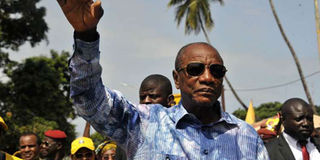Guinea leader urges ban on full Islamic veil

Guinea’s President Alpha Condé waves at supporters on October 8, 2015 during a presidential election campaign in Conakry. President Condé has called on the chairman of the regional bloc to introduce a bill that would ban the wearing of the full Islamic veil in west Africa. PHOTO | CELLOU BINANI | AFP
What you need to know:
- The Guinean leader lauded Mr Sall for banning the full veil in his country and urged him to introduce the bill during the next Ecowas summit later this year in Abuja, Nigeria.
- He cited the example of Nigeria, Chad, Niger and Cameroon where Islamic women wearing the full veil were used by Boko Haram to commit suicide attacks in public places.
Guinea’s President Alpha Condé has called on the chairman of the regional bloc to introduce a bill that would ban the wearing of the full Islamic veil in west Africa.
Mr Condé made the recommendation on Wednesday in a letter to Senegal’s President Macky Sall who is Chairman of the Economic Community of West African States (Ecowas).
The Guinean leader lauded Mr Sall for banning the full veil in his country and urged him to introduce the bill during the next Ecowas summit later this year in Abuja, Nigeria.
President Condé argued that ‘‘a close examination of the issue by heads of state would lead to a deeper reflection that will lead to the banning of the full veil in Ecowas space.’’
Mr Condé justified his recommendation that was published in part by the media in Senegal that “in many of our countries, terrorists were increasingly using the full veil to carry out criminal acts against peaceful citizens’’.
He cited the example of Nigeria, Chad, Niger and Cameroon where Islamic women wearing the full veil were used by Boko Haram to commit suicide attacks in public places.
Back in Senegal it has been discovered that most of the women wearing the full veil were Guinean nationals.
SALL'S DECISION TENABLE
Two weeks ago, President Sall banned the wearing of the full veil and this week announced a significant increase in the defence budget prompted by persistent terror threats.
But several opposition and civil society representatives have been accusing President Sall’s government of raising an ‘’unjustified alarm’’ against terrorists attacks.
Responding, Senegal’s minister of foreign affairs Mankeur Ndiaye had insisted that government was right to make provisions even for “unforeseeable circumstances”.
“The thing is happening at our doorstep, so are we wrong now by moving to forestall it,” he retorted recently.
Senegal is known to have several dormant Islamist extremist cells belonging to the different Muslim sects that are susceptible to carry out terrorist activities.
Over the last two months, the government alleged that one of them has been killed fighting along Boko Haram troops in Nigeria.
Another, Makthar Diockhane was arrested by Niger police early this month as he attempted to enter Nigeria with large sums of money including fake foreign currencies.
In Senegal itself, several radical Imams and the alleged accomplices have been picked up from different parts of the country.




